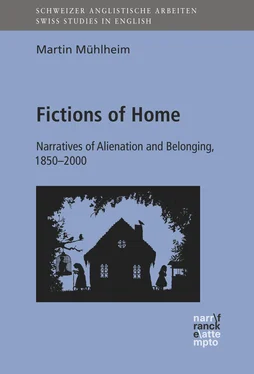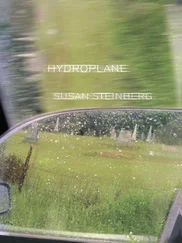Evidently, each of the subsequent chapters constitutes an attempt to follow these precepts, and they may be judged accordingly.
Two caveats, however, are in order. First, the fact that this study covers only texts from between 1850 and 2000 means that all claims and findings must be treated with due caution when applied to earlier periods. Second, the six primary texts discussed in the main chapters do not constitute anything like a representative sample of fictions of home. One simple reason for this is the sheer number of texts that explicitly make home and belonging their theme. A quick search on Amazon.com, for instance, yields 16,944 titles in the category “Literature & Fiction” that feature the word home in their titles, and this is of course only the proverbial tip of the iceberg, as the theme of belonging can easily be central to a novel that does not announce this fact in its title.3 At the same time, the principle of selection for the primary texts used in this study is not entirely random: three of the texts are English ( The Mill on the Floss , Mrs. Dalloway , and Union Street ), while the other three are American ( Moby-Dick , Absalom, Absalom! , and The Virgin Suicides ); three of the texts were written by men (Herman MelvilleMelville, Herman, William Faulker, and Jeffrey EugenidesEugenides, Jeffrey), while the other three were written by women (George Eliot, Virginia WoolfWoolf, Virginia, and Pat BarkerBarker, Pat); and the texts date, roughly, to the beginning, the middle, and the end of the period covered in this study (i.e. 1851 and 1860; 1925 and 1936; 1982 and 1993). There is thus at least some socio-historical breadth to the corpus, though serious limits remain (e.g. all the English authors are women, whereas all the American authors are men; all six authors are white). At the same time, one aim of the six readings presented in the main chapters is to open up each of the primary texts to a wider range of themes, and thus hopefully to make it easier for readers from various backgrounds to discover, perhaps in unsuspected places, a little piece of that place called home.
The fact that home is such a fundamental and complex concept also means that it would be difficult to provide a comprehensive overview of the previous critical literature on the topic. Fortunately, this is also to some extent unnecessary, as Alison BluntBlunt, Alyson and Robyn Dowling’s study Home (2006) constitutes an excellent survey of key concepts and debates (with a particular focus on the fields of geographygeography, sociology, and anthropology, but by no means limited to them). Moreover, it is difficult to think of a more concise definition of home than the one suggested by BluntBlunt, Alyson and DowlingDowling, Robyn, who contend that home is “a spatial imaginary : a set of intersecting and variable ideas and feelings, which are related to context, and which construct places, extend across spaces and scales, and connect places” (2; original emphasis). Home, for BluntBlunt, Alyson and DowlingDowling, Robyn, is thus neither purely imaginary nor entirely reducible to the places and contexts that form the concept’s material basis.4 Crucially, the phrases “variable” and “related to context” in BluntBlunt, Alyson and DowlingDowling, Robyn’s definition also hint at the temporal dimension of home noted earlier (highlighted as well by SandtenSandten, Cecile and TanTan, Kathy-Ann 3).5 To render this aspect more explicit, we ought perhaps to amend their formula and say that home is a spatiotemporal imaginary .6
The dual quality of home as simultaneously extending into the realm of the imaginary and into spatiotemporal reality, in turn, constitutes the main reason why analyzing fiction can contribute to our understanding of the phenomenon of home as such. In The Fictive and the Imaginary (1991), Wolfang IserIser, Wolfgang rejects the conventionalconventions binarybinary oppositions opposition between fiction and reality, positing instead that we ought to envisage a triadic relationship between the real, the fictive, and the imaginary. According to IserIser, Wolfgang, a fictional text necessarily incorporates aspects of lived reality, but at the same time it is never reducible to this referential dimension. Instead, the act of fictionalizing also involves components and effects that do not form part of the represented reality, and which must therefore stem from some other source. IserIser, Wolfgang suggests that this other source is the imaginary, and in his view the act of fictionalizing constitutes the creative force that negotiates between the imaginary and the real. More precisely, the act of fictionalizing ‘de-realizes’ the real by relating it to the imaginary, just as it gathers or ‘concretizes’ the free-floating impulses of the imaginary into a comprehensible shape or Gestalt ( The Fictive and the Imaginary 1–4).7 The fictive, in short, is the result of a dialecticaldialectic confrontation between the real and the imaginary, and as such it is precariously poised between these different realms.
Considering that fiction’s precarious negotiation between the two poles of the real and the imaginary also applies to the concept of home, we may now propose that home is itself very similar to fiction: not in the sense of being ‘untrue’ or simply opposed to the real, but in the sense that any particular idea of home is the result of a fictionalizing act that intermingles the real with the imaginary (and vice versa).8 Fictions of home are therefore not merely narratives that happen to thematize the dialecticdialectic of alienationalienation and belonging; they are also, as fictions, structurally akin to the mental processes that allow for the construction and maintenance of home in the first place. More specifically – as Franco MorettiMoretti, Franco suggests in Signs Taken for Wonders (1983) – fictional texts constitute formalform and content compromises between the real and the imaginary, and as such they train us “without our being aware of it for an unending task of mediation and conciliation” (40).9 Fictions themselves, that is to say, are best understood as symbolicalsymbolical home-makinghome-making practices, in the broadly MarxistMarxism and Marxist criticism sense that they invent “imaginary or formalform and content ‘solutions’ to unresolvable social contradictionscontradiction” (JamesonJameson, Fredric, The Political UnconsciousUnconscious 64).10 Conversely, if fictions are imaginary attempts to reach formalform and content compromises between real-life contradictionscontradiction, then this implies that one important task for literary criticsliterary critics is to unearth the problems that fictions attempt to solve (i.e. to ‘unpack’ the conflicting forces that led to the fictional compromisecompromise in the first place).11
And yet, even though home is structurally akin to fiction, the concepts differ in two important respects, the first of which has to do with different types of truth claimstruth claims. The question of truth in fiction is, of course, a thorny issue (e.g. EagletonEagleton, Terry, The Event of Literature 106–166; Lamarque 220–254), but for our purposes it will suffice to say that fictional texts involve three basic truth claims:
(a) claims about what is true within the fictional world or with regard to the fictional text (i.e. intra-fictional truth claimstruth claims);
(b) claims about the adequate representationrepresentation of types of real-world phenomena, or kinds of real-world experiences (i.e. generalizing truth claimstruth claims);
(c) claims about the correspondence between, on the one hand, information provided in the fiction, and, on the other, a particular state of things in the real world (i.e. truth claimstruth claims of one-to-one correspondence ).
Читать дальше












